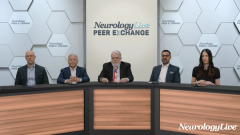
Targeted Therapy Options in MG
Nicholas Silvestri, MD, FAAN, and Tuan Vu, MD, provide an overview of the current FDA-approved targeted therapies for the treatment of MG.
Episodes in this series

This is a video synopsis/summary of a panel discussion involving James Howard, MD; Nicholas Silvestri, MD, FAAN; Tuan Vu, MD; Ali Habib, MD; and Beth Stein, MD.
The discussion focuses on advancements in targeted therapies for myasthenia gravis (MG). Three major trials examined complement inhibitors: the REGAIN trial evaluated eculizumab, showing significant efficacy in improving symptoms with good safety profiles. The REGAIN trial demonstrated significant improvements in patients with severe disease using complement inhibitors. The CHAMPION-MG trial studied ravulizumab, indicating improvements with preserved safety. The RAISE trial investigated zilucoplan, a subcutaneous macrocyclic peptide, showing efficacy across various outcome measures.
Neonatal crystallizable fragment receptor (FcRn) inhibitors, including efgartigimod, rozanolixizumab, and nipocalimab, have shown promising results in trials, with nipocalimab currently undergoing testing. These inhibitors have demonstrated positive results in reducing MG activities of daily living (ADL) scores.
B-cell depletors, like rituximab, a monoclonal antibody against B-cell membrane molecule CD20, have been used since 1999. While initially uncertain, international consensus in 2021 supports its use in acetyl receptor refractory patients and musk-positive patients who fail first-line therapy. Rituximab is particularly favored for musk-positive patients with significant bulbar respiratory involvement.
Overall, these advancements provide encouraging treatment options for myasthenia gravis, with different therapies tailored to specific patient populations.
Video synopsis is AI-generated and reviewed by NeurologyLive editorial staff.
Newsletter
Keep your finger on the pulse of neurology—subscribe to NeurologyLive for expert interviews, new data, and breakthrough treatment updates.














